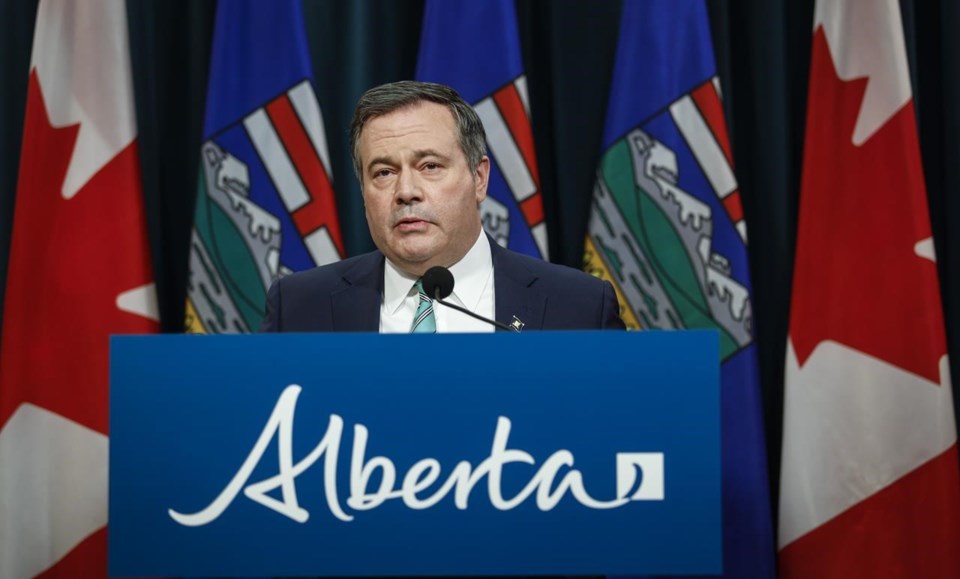Alberta Health Minister Jason Copping says the vast majority of scheduled surgeries are still being done and overflow field units for COVID-19 patients are no longer needed as the latest wave of the pandemic continues to recede.
“We firmly believe hospitalizations will continue to trend down in the coming days and weeks, even as the restrictions exemption program and mandatory masking for children and youth come to an end,” Copping told reporters Thursday.
Copping said that while emergency units and hospitals are still under severe strain due to high patient volumes, other work is getting done, including more than 90 per cent of scheduled surgeries compared with pre-pandemic levels.
He said Alberta Health Services is now able to close overflow pandemic response units in Edmonton and Calgary.
“The waiting list (for surgery) is actually down slightly in recent weeks,” said Copping.
“This reflects lower levels of referrals due to the pandemic, and that demand will come back as we get the system back to working normally.”
Dr. Deena Hinshaw, Alberta's chief medical officer of health, reported 1,586 patients in hospital with COVID-19, including 126 in intensive care.
Hinshaw said starting next Wednesday, fully immunized workers in continuing care facilities will be allowed to work at multiple sites, ending a ban implemented in early 2020 to prevent spread of COVID-19.
“Fortunately, vaccines have been extremely helpful in reducing the risk of severe outcomes, and we can now remove this restriction on fully vaccinated workers to mitigate the risk of sites not having enough workers to care for patients,” said Hinshaw.
Earlier this week, Premier Jason Kenney announced a phased plan to eliminate all COVID-19 restrictions over the coming weeks. It started Wednesday with the end of Alberta’s vaccine passport, known as the restrictions exemption program.
Starting Monday, all mandatory mask rules will be cancelled for children 12 and under in all settings and for all students in schools.
Education Minister Adriana LaGrange said the COVID-19 risk is much lower for children than adults, and that it’s important schools return to normal as soon as possible, including without mask mandates, for mental health and socialization.
Advanced Education Minister Demetrios Nicolaides informed post-secondary schools that he expects them to return to pre-pandemic rules when the next phase begins, expected March 1. He said he expects they will mesh their rules with provincial ones, meaning no physical distancing rules, mask mandates or proof of vaccination requirements.
Two leaders with the Alberta Medical Association said the situation remains fluid and worrisome, given the high number of patients in hospital with COVID-19.
"My concern is that there's not a lot of leeway in the system for any sudden rise in numbers,” said association president Dr. Michelle Warren.
"If we're wrong and it's too soon and the numbers jump sharply, we're just not going to be able to manage."
Kenney has said the government won’t proceed with the next phase of health restriction cancellations on March 1, including the end of the provincial mask mandate, unless it’s clear hospital numbers are trending down.
Warren said the association hopes the province will follow through.
"If the numbers start to go up or start to plateau, I think we need to hold the government to that commitment to not proceed, to not just forge ahead for the sake of forging ahead,” she said.
Dr. Paul Parks, head of emergency medicine section for the AMA, said front-line doctors remain worried about the sudden shift in COVID-19 policy, especially with hospitalizations precariously high.
“We have very serious concerns that this isn't driven by modelling or the public health data or the public health experts,” said Parks.
“The thing that's the most worrisome is whenever our province and our government has lifted restrictions, or protections actually, what happens is it signals to the public that a pandemic is not as much of an issue anymore.
“That ends up changing behaviours and we end up seeing more infections and more spread."
This report by The Canadian Press was first published Feb. 10, 2022.
Dean Bennett and Alanna Smith, The Canadian Press



